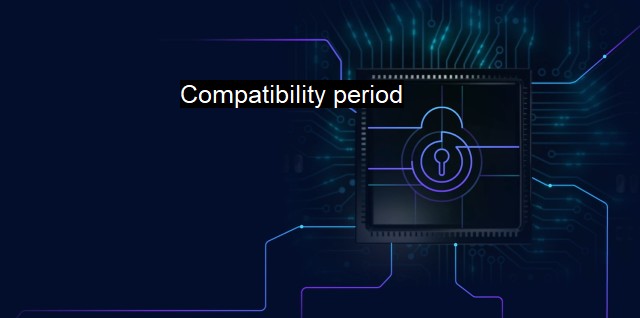What is Compatibility period?
Understanding the Critical Role of Compatibility Period in Cybersecurity: How Antivirus Software Can Function Optimally on Your Device OR Stay Protected with Antivirus Software Updates: The Significance of Compatibility Period in Cybersecurity
The term "compatibility period" refers to the period during which two systems, software, or components are able to coexist and work together effectively without causing any issues or alterations in functionality. In the context of cybersecurity and antivirus software, it typically insinuates the time frame during which an antivirus software or cybersecurity solution can effectively work with a system, an application, or another security software.It's essential to acknowledge that in the modern technological environment, individuals and businesses greatly rely on a variety of software and applications to perform their day-to-day affairs. While these tools come with their own security setups, these are typically not comprehensive enough. As a result, there is a necessity for supplemental security measures, notably antivirus or cybersecurity software.
Such software, though, comes up with its specifics. They are designed to run on particular versions of operating systems, with definite types of hardware, or along with certain applications. When a cybersecurity solution or antivirus software that is not entirely compatible with these factors comes into play, a series of complications can arise. As an example, an upgrade in a current system could render antivirus software obsolete.
So now you may realize that compatibility is not a one-time factor, but a sustained requirement. Cybersecurity is a rapidly evolving field, with hackers on the perennial hunt for new vulnerabilities, while businesses and domestic users continuously refine and update their systems. In such an environment, cybersecurity software must remain compatible over these updates and shifts.
Various antivirus capabilities, like comprehensive scanning, real-time protection, malicious website blockers and others, are affected during "compatibility periods" too. The inability of an antivirus to alter its functionalities compatible with other system software might lead to decrease its efficiency. there are even cases when two similarly aimed pieces of software, such as two firewalls, elicit undesirable interactions due to their compatibility problems.
During the compatibility period, the antivirus software is able to keep up with these changes due to the flexible nature with which it has been built. This involves regular updates that future-proof the software and make it adaptable. Virus definitions are updated, patches are implemented, and frequently the program is capable of preempting upcoming shifts in the cybersecurity landscape. The software works hard to minimize deficiencies that could allow cyberattacks to occur, while not entering conflict with other resident software and applied optimizations.
Yet, the compatibility period ends when the cybersecurity software cannot match the pace of changes anymore. This can happen for various reasons. The provider may deselect to continually upgrade the software – typically this happens when a new version has been released. Alternatively, the changes in the environment could be too radical or fast, making it unachievable for the software to keep up. Eventually, non-support is the reality and users are put at risk.
To sum up, the "compatibility period" is a crucial element when considering cybersecurity and antivirus software. Compatibility ensures protection against emerging threats, continuity of operations while still delivering the necessary cybersecurity shield, compatibility with other running software and systems, and ensuring that the cybersecurity tools remain relevant in the rapidly evolving technology environment. Nontheless, the apparent fact is a sound compatibility doesn’t last forever, rendering careful continuous management of web security assets a necessity.

Compatibility period FAQs
What is a compatibility period in cybersecurity and antivirus software?
A compatibility period refers to the period of time during which a particular version of antivirus software is still supported and maintained for use with a specific version of an operating system or other software. This means that during this period, users can expect their antivirus software to function properly and receive necessary updates on the operating system they are using.Why is a compatibility period important in cybersecurity and antivirus software?
A compatibility period is important in cybersecurity and antivirus software because it ensures that users have access to the latest security updates and fixes for their antivirus software. This helps to prevent security breaches and other threats to their devices, data, and networks.How long is the typical compatibility period for antivirus software?
The length of a compatibility period for antivirus software can vary depending on the software and the operating system it is designed to protect. Typically, compatibility periods range from one to three years, though some software may have longer or shorter periods.What should I do when the compatibility period for my antivirus software ends?
When the compatibility period for your antivirus software ends, you should consider upgrading to a newer version of the software or finding an alternative that is compatible with the operating system you are using. Running unsupported software can leave your devices and data vulnerable to security threats, so it is important to stay up-to-date with the latest security technologies and updates.| | A | | | B | | | C | | | D | | | E | | | F | | | G | | | H | | | I | | | J | | | K | | | L | | | M | |
| | N | | | O | | | P | | | Q | | | R | | | S | | | T | | | U | | | V | | | W | | | X | | | Y | | | Z | |
| | 1 | | | 2 | | | 3 | | | 4 | | | 7 | | | 8 | | |||||||